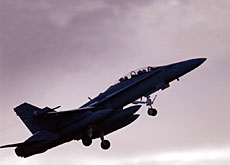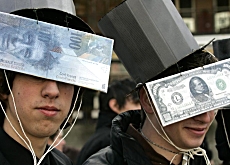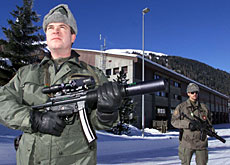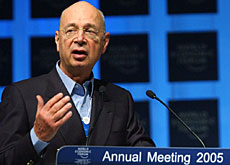Swiss army out in full force in Davos

Up to 5,500 Swiss soldiers, as well as fighter jets and army helicopters, are providing security at this week's annual meeting of the World Economic Forum (WEF).
Criticised in past years, the army’s deployment in Davos is less controversial this time around.
The lion’s share of the militia force has been in place since mid-January, taking part in mandatory military “refresher courses”. These soldiers are being called up to provide security for the Davos meeting.
They are responsible for securing the roads in and out of the mountain resort, and protecting Davos’ power and water supplies.
Professional troops will ensure the safety of the high-level participants and man vital checkpoints.
The airspace over Davos will be closed until January 30 – a day after the meeting ends. FA/18 fighter jets will enforce the ban, complemented by two PC 7 planes, and around 20 air force helicopters will transport VIPs to and from the venue.
“Routine”
For the past couple of years there have been no major incidents or disruptions at the WEF meeting, and no anti-globalisation demonstrations are planned in or close to Davos this year.
However, the authorities are not taking the deployment lightly.
“I don’t like hearing the word ‘routine’ because unforeseen events cannot be ruled out,” army spokesman, Stefan Hofer, told swissinfo.
The head of the Swiss armed forces, Christophe Keckeis, has praised the army’s past performance, saying it has made a major contribution to Switzerland’s reputation as a safe place for international conferences.
Parliament first approved sending a large contingent of soldiers to Davos for the 2004 meeting. Parliament’s blessing was required since the deployment amounted to more than 2,000 soldiers.
Criticism
The decision to send such a large force was harshly criticised at the time because of the considerable expense. Providing security for the event costs Swiss taxpayers around SFr10 million ($7.92 million).
Social Democrats and Green Party members argued that public money should not be used to protect a meeting of the rich and powerful where there was no public interest.
But the army’s presence in Davos is less controversial this year since parliament in 2004 approved a deployment for two years, 2005 and 2006.
And because the Swiss have seen their army increasingly involved in providing security and logistical support at events other than WEF over the past couple of years.
Despite its high profile in Davos, the army is subordinate to the cantonal police force of Graubünden, which is ultimately responsibility for security at WEF, including demonstrations and protest actions.
swissinfo
The Swiss army have provided support at WEF since 2000, when 70 soldiers were deployed.
5,500 took part in the Davos security force last year, and the same number is expected this year.
Around the same number were used to provide security at the G8 summit just across the border in the French town of Evian in 2003.
Under the Swiss constitution, the army is a militia force.
Military service is obligatory for Swiss men, voluntary for women.
Current reforms call for a reduction from a 350,000- to a 140,000-strong army.
Military service begins at the age of 20 and ends, depending on rank, between 30 and 50 years of age.
In 2005, around 40% of all eligible men were excused as “unfit” for duty.
The figure was only 21% in 1994.

In compliance with the JTI standards
More: SWI swissinfo.ch certified by the Journalism Trust Initiative



You can find an overview of ongoing debates with our journalists here. Please join us!
If you want to start a conversation about a topic raised in this article or want to report factual errors, email us at english@swissinfo.ch.